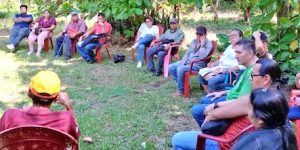
EL SALVADOR, November 15— “I am pleased to have you here, to share with you, comrades from the factory, part of our history of struggle. How we are today is important, but where we come from in this process of struggle is also important.” F, a farmworker comrade, welcomed everyone to the meeting.
Amidst a pleasant climate and full of camaraderie, we strengthened the communist social relations between workers (male and female) from the city and the countryside. We discussed the importance of knowing the history of struggle of the comrades in the revolutionary process of the fmln in the 1980s. Now they continue to fight for communism, organized in ICWP.
“I did not participate in marches or church takeovers. I joined the guerrilla army once and for all. About a thousand of us were in a rally. They explained the harsh situation of the repression and that it was necessary to organize ourselves. I saw the inequality and repression where we lived. The paramilitaries came and stole everything from us: corn, beans, candy, animals. But when we armed ourselves, things were different. Then we defended ourselves. Living together during that war meant discipline and a lot of solidarity,” said a comrade.
“A few years ago I met the International Communist Workers’ Party (ICWP) and I joined this fight. It is necessary to end this system that keeps exploiting workers and especially you who work in the maquilas (sweatshops),” said F.
A farmworker comrade ‘M’ said, “There are several ways of joining a process of struggle. In my case it was under government repression. I had two options: one was to enlist in the government army and the other was to organize myself in the guerrilla army. I chose the second. Others did so out of political conviction and believed in the need to fight for a better world.”
He continued, “Today in the postwar period I understand the social struggles and I am aware of some arrangements made by the fmln and government commanders and I did not agree. We needed changes for the working class, and these did not happen.”
Three comrades told their stories. Then a worker said, “This meeting has been very important because sometimes we only have the version that the government gave at that time. They said that the guerrillas were bad people.” She continued, “I realize that this is not the case, that there were reasons to fight.”
“This get-together that we have had here is very important. We learn from this. The history of these comrades inspires us to continue fighting in ICWP,” said a comrade. She asked a question: How do we relate to friends, family, co-workers, and the masses, with the aim of recruiting more workers to ICWP? What do we discuss with them?
“When I pass out Red Flag, I take the opportunity to talk a little, not only about political issues, but also about their families,” replied a worker.
Overcoming the Bosses’ Divisive Social Relations
“A co-worker from the factory who is a Party member made me see that we have to be different,” said another worker. “We know that social relations under capitalism divide workers, because the economic system determines how we relate to others in the job.
“In the production process there is hardly any room to talk because the quotas are very high. They watch us so that we do not talk to each other. So as communists we must fight to achieve the type of relationships we want to establish to be able to grow as a party,” she concluded.
“We take advantage of the little time we have left to meet and strengthen the ties of friendship and politics,” added another worker.
This is part of the communist relations that we as ICWP are building with friends and comrades here, in India, South Africa, the US, and other parts of the world. Thus, we break borders and languages, and we unify the international working class.
At the end of the activity, we concluded that our goal is to fight directly for communism. Only organizing more workers to fight for this line will make this possible.

